South Africa
South Africa has become a COVID-19 model for the continent in many ways since it confirmed its index case on 5th March, 2020. From the area of testing through to record number of recoveries, South Africa has been praised for pro-activeness in combating the virus.
The economic intervention measures rolled out by President Cyril Ramaphosa has also been classed as one of the most comprehensive across the continent. South Africa was one of the earliest to roll out such measures.
That President Ramaphosa is also the current Chairperson of the African Union, AU; means he has the delicate task of juggling national tasks withe the continental as Africa seeks global support to combat the pandemic.
Key statistics as at July 21
- The total number of confirmed cases = 408,052
- The total number of tests so far = 2,632,106
- Total death toll = 6,093
- Total recoveries = 236,260
- Most impacted provinces = Guateng, Western Cape, Eastern Cape, Kwa Zulu-Natal
July 24:
Global hot spot South Africa is seeing a “huge discrepancy” between confirmed COVID-19 deaths and an unusually high number of excess deaths from natural causes, while Africa’s top health official said Thursday the coronavirus is spreading there “like wildfire.”
A new report by the South African Medical Research Council, released late Wednesday, shows more than 17,000 excess deaths from May 6 to July 14 as compared to data from the past two years, while confirmed COVID-19 deaths have surpassed 6,000.
“The numbers have shown a relentless increase — by the second week of July, there were 59% more deaths from natural causes than would have been expected,” the report says.
The council’s president, Glenda Gray, said the excess deaths could be attributed to COVID-19 as well as other widespread diseases such as HIV and tuberculosis while many health resources are redirected toward the pandemic.
Meanwhile, some South Africans are thought to be avoiding health facilities as fears of the new virus spread and public hospitals are overwhelmed.
“The coronavirus storm has indeed arrived,” President Cyril Ramaphosa told the nation Thursday evening as cases surpassed 400,000. He announced that schools would “take a break” for a month to protect students.
South Africa now has the world’s fifth largest caseload. It makes up more than half the confirmed cases on the African continent with 408,052.
One of the country’s nurses was buried Thursday, the latest of more than 5,000 infected health workers across South Africa.
Duduzile Margaret Mbonane died just a month before her retirement, her husband said. She was 59. Colleagues dressed in white stood at her outdoor memorial and recited the nurses’ pledge of service.
Some were scared. “As I speak now, most of our colleagues are so infected,” fellow nurse Lindiwe Yeni said. “We looked after people not knowing. We only find that after two or three days.” She wants a rapid test for the virus.
“The government must assist our nurses with protective clothing,” said Duduzile’s husband, Herbert Mbonane. “Maybe my wife wouldn’t have died if personal protective equipment were made available in time.”
Those on the front lines have been hit hard: The World Health Organization said Thursday more than 10,000 health workers have been infected in its African region, which is largely sub-Saharan Africa.
WHO Africa chief Matshidiso Moeti said she wasn’t able to say how many health workers, the majority of them nurses, have died. She said 41 million items of personal protective equipment are set to begin shipping from China this weekend.
Africa’s 54 countries now have 768,978 cases overall. South Africa is “very concerning,” the director of the Africa Centers for Disease Control and Prevention, John Nkengasong, told reporters.
And now other African countries are a growing problem, notably Kenya, where Nkengasong said cases have “taken off very, very quickly.” East Africa’s commercial hub now has more than 15,000 confirmed cases.
Local transmission of the virus has begun in many countries across the continent, and once it is seeded in vulnerable communities such as slums it “spreads like wildfire, which is what we’re seeing in South Africa now,” Nkengasong said.
The true number of cases in Africa is unknown, as shown by the new report in South Africa, the continent’s most developed country.
Testing remains limited by shortages of supplies, with just 7.2 million tests conducted on the continent of 1.3 billion people. Data collection is incomplete as some people die at home or before being tested. Few African countries were equipped to widely track deaths even before the pandemic.
“Community deaths, we just don’t know how countries are capturing that,” Nkengasong said.
Africa’s case fatality rate remains relatively low at just over 2%, but that measure is weakened if authorities don’t know the real numbers.
As cases climb, the Africa CDC director said a “universal masking of the continent is very important at this critical stage” as some officials in South Africa and elsewhere warn against pandemic fatigue.
Many African countries locked down quickly as the pandemic raced across Europe and the United States, delaying its spread at home. But economic pressures have forced most governments to loosen restrictions, though South Africa this month returned to a ban on alcohol sales to help free up precious hospital beds.
“The continent still, as a whole, has a chance to fight back in a successful manner,” Nkengasong said, pointing out that 37 countries have reported less than 5,000 cases.
AP
Key statistics as at July 21
- The total number of confirmed cases = 381,798
- The total number of tests so far = 2,536,921
- Total death toll = 5,568
- Total recoveries = 208,144
- Most impacted provinces = Guateng, Western Cape, Eastern Cape, Kwa Zulu-Natal
July 22: Concerns as cases continue to surge
There is growing concern that South Africa’s hospitals may not be able to cope with the numbers of COVID-19 patients expected in the next two months.
Neighboring Zimbabwe imposed a dusk to dawn curfew, banned large public gatherings and reduced business operating hours to try to slow the spread of the disease.
The number of confirmed coronavirus cases in South Africa continues to surge, accounting for more than 50% of cases in Africa and making it the country with the fifth-highest number of cumulative reported infections in the world.
South Africa has 373,628 confirmed cases, including 5,173 deaths, according to figures released by the health minister.
The rapid rise of the rate of infections in the country has raised concerns about whether South Africa’s hospitals will be able to cope with the influx of COVID-19 patients when the peak of cases is expected between August and September.
RECOVERING FROM MODERATE COVID-19 ILLNESS-WHAT TO EXPECT
While recovering from a moderate case of COVID-19, it’s likely one can expect to experience prolonged fatigue, cough and even shortness of breath. And these prolonged symptoms can go on for several weeks. #COVID19Recovery pic.twitter.com/MbDBfIxwph— NICD (@nicd_sa) July 22, 2020
Many hospitals in Gauteng province, South Africa’s virus epicenter that includes the largest city of Johannesburg and the capital Pretoria, are already feeling the pressure of increasing numbers of COVID-19 patients.
Health minister Zweli Mkhize warned earlier this month that the country did not have enough hospital beds equipped to treat the expected numbers of COVID-19 patients. He appealed to citizens to wear face masks, now mandatory in all public places, and to keep a distance from others.
“We are extremely concerned that fatigue seems to have set in and South Africans are letting down their guard at a time when the spread of infection is surging,” said Mkhize, in an address to the nation last week.
Zimbabwe has reported 1,713 cases, up from about 50 two months ago, and President Emmerson Mnangagwa on Tuesday evening announced a night curfew, banned political, religious and social gatherings, and reduced business operating hours in order to try to slow the spread of the virus.
RECOVERING FROM MILD COVID-19 ILLNESS- WHAT TO EXPECT
About 80% of people who are infected with the new coronavirus will either experience mild symptoms or be completely asymptomatic. Someone with mild symptoms will recover within a week to 10 days. #COVID19Recovery pic.twitter.com/dObNRcGQVJ— NICD (@nicd_sa) July 22, 2020
Mnangagwa said the “curtailing of freedoms we have always enjoyed, and had grown accustomed to” was necessary, although some claim the banning of political gatherings is aimed at suppressing an anti-government protest planned for July 31.
The accelerating spread of COVID-19 in South Africa could be a precursor to what will happen in the rest of Africa, said World Health Organization executive director of emergencies, Dr. Mike Ryan.
“I think this isn’t just a wake-up call for South Africa, We need to take what is happening in Africa very seriously,” said Ryan at the WHO weekly news conference in Geneva on Monday. “Many of those countries exist in the midst of fragility and conflict, many of them need external help support.”
AP
Key statistics as at July 15
- The total number of confirmed cases = 311,049
- The total number of tests so far = 2,278,127
- Total death toll = 4,453
- Total recoveries = 160,693
- Most impacted provinces = Guateng, Western Cape, Eastern Cape, Kwa Zulu-Natal
July 16: Virus epicenter shifts away from Cape Town: AP report
Health officials in South Africa decided Thursday to reduce the capacity of a COVID-19 field hospital in Cape Town, a sign that the situation may be improving in the city that was Africa’s first coronavirus epicenter.
Declining numbers of patients prompted the decision to reduce the size of Khayelitsha field hospital from 60 to 30 beds, indicating cautious optimism among health workers.
The field hospital will send 30 of its life-saving oxygen concentrating machines to other parts of the country where they are desperately needed, an aid worker, Sean Christie, said. Where they will go is still to be decided.
There have been calls for the machines from “all over” South Africa, he said. They take room air and boost its oxygen content before delivering it to a patient through a mask or nasal tube and have proved to be critical in helping save the lives of some COVID-19 patients.
Virus hospitalizations are surging across other parts of South Africa, especially in Gauteng province, which includes the country’s biggest city, Johannesburg, and the capital, Pretoria. Numbers are also growing significantly in the more rural Eastern Cape province.
The Khayelitsha field hospital was constructed in a sports hall in one of Cape Town’s poorest and most densely populated areas as a partnership between Doctors Without Borders, also known by its French acronym MSF, and the local Western Cape province’s health department.
The field hospital will be reduced to 50% of its capacity as soon as possible, MSF spokesman Christie told The Associated Press.
He said some of the MSF team would be re-deployed to help in a town in the Eastern Cape province, where health services are reportedly struggling.
Gauteng province this month overtook the Western Cape in total confirmed COVID-19 cases. In just a week, Gauteng’s cases have increased by more than 37,000 to 112,714, according to the health ministry. In the same time period, Cape Town’s confirmed cases increased by just over 8,000 to 81,556.
South Africa has more than 311,000 cases, according to the tally by Johns Hopkins University, making it the country with the eighth-biggest caseload in the world, above Britain, Spain and Italy. South Africa has had relatively few deaths, at around 4,500.
There are fears the death rate may spike if hospitals elsewhere in South Africa aren’t able to handle the surge in cases. Gauteng, currently the province under the most pressure, is South Africa’s most populated with more than 12 million people.
“The storm of the virus is expected to hit Gauteng, which has 25% of South Africa’s people, many in densely populated areas,” Bandile Masuku, the province’s top health official, said Thursday.
“We expect the pandemic to grow here in Gauteng, increasing pressure and stress on our health system, from the end of July, perhaps reaching a peak from mid-August to September,” he said on a webinar by a local news site, the Daily Maverick.
The emergency could “expose the gaps” in Gauteng’s health care system, he said, describing how the province is racing to build field hospitals, supply beds with oxygen and hire doctors and nurses.
Key statistics as at July 7
The total number of confirmed cases = 205,721
The total number of tests so far = 1,864,111
Total death toll = 3,310
Total recoveries = 97,848
Most impacted provinces = Guateng, Western Cape, Eastern Cape, Kwa Zulu-Natal
July 7: Cases pass 200,000 mark
South Africa is Africa’s most impacted nation by a mile even as government continues to reopen the economy and schools across the country. As of Monday July 1, coronavirus cases in the country had crossed the 200,000 mark. The figure represents over 41.7% of Africa’s total caseload which stood at 492,805 cases as at July 7, 2020 at 10:00 GMT according to John Hopkins University tallies.
According to Health Minister Zweli Mkhize, four provinces – Gauteng, Western Cape, Eastern Cape and KwaZulu-Natal – which were at risk of a surge could be locked down to better control spread.
The country has consistently recorded thousands of new cases daily. Government has defended a strict lockdown stating that it was key to spread of the virus.
South Africa has also run over 1.8 million tests, the only African country to reach that figure. The death toll has passed 3,000 with over 97,000 recoveries. Concerns have been raised about the health system – one of Africa’s most developed, being overwhelmed by cases.
The closest country in terms of cases is Egypt with over 76,000 cases whiles Nigeria is going towards the 30,000 mark. Ghana breached 20,000 recently whiles Algeria with 16,000 plus cases completes the top five.
South Africa, Africa’s most industrialized nation is also involved in the human trials for a Covid-19 vaccine developed by Oxford University.
#COVID19 UPDATE: A total of 33,950 #COVID19 tests were conducted in the last 24 hours. There are 8975 new cases of #COVID19. Regrettably, we report 111 more #COVID19 related deaths bringing the total number of deaths to 3310. We send our deepest condolences. pic.twitter.com/F8odirwAZ4
— NICD (@nicd_sa) July 6, 2020
Key statistics as at June 22
The total number of confirmed cases = 101,590
The total number of tests so far = 1,353,176
Total death toll = 1,991
Total recoveries = 53,444
Most impacted provinces = Guateng, Western Cape, Eastern Cape, Kwa Zulu-Natal
June 23: Africa’s 1st COVID-19 vaccine trial starting
Researchers in South Africa say the first COVID-19 vaccine trial on the African continent is set to get underway on Wednesday.
The University of the Witwatersrand says the vaccine developed by University of Oxford researchers is already being evaluated in a large trial in the UK and a similar trial is beginning in Brazil.
The announcement came hours after South Africa reported that total coronavirus cases in the country surpassed 100,000 as of Tuesday. South Africa accounts for almost one-third of the infections on the African continent.
The South Africa vaccine trial aims to enroll 2,000 participants. The first are to get vaccinated this week in Gauteng province, home of economic hub Johannesburg and the capital, Pretoria.
Others will be vaccinated in the hot spot of Western Cape province. Shabir Madhi, who leads the trial, said it begins as South Africa enters winter and the flu season and as pressure increases on hospitals.
AP
#COVID19 UPDATE: A total of 25 116 #COVID19 tests were conducted in the last 24 hours. There are 4 289 new cases of #COVID19. Regrettably, we report 61 more #COVID19 related deaths; 39 from the WC, 18 from EC , 3 from KZN and 1 from Limpopo. We send our deepest condolences. pic.twitter.com/rpowBkvcir
— NICD (@nicd_sa) June 22, 2020
May 12: US donates ventilators
The U.S. government is donating “up to 1,000” ventilators to South Africa to help the country respond to COVID-19 as the Trump administration addresses criticism that it hasn’t done enough for countries in need.
“South Africa is the first country in the world to receive this state-of-the-art equipment” from the National Security Council and USAID, the U.S. Embassy said in a tweet. Last week, however, Mexico said it received a U.S. shipment of 211 ventilators as part of aid promised by President Donald Trump.
The U.S. soon will make similar donations to countries around the world, according to embassy officials. South Africa has the most confirmed coronavirus cases in Africa with more than 11,300, including more than 200 deaths. Virus cases across the 54-nation continent are now above 66,000.
For weeks, U.S. officials have indicated that the virus crisis at home has delayed the shipment of crucial medical equipment to other countries.
But in recent days the Trump administration has been making plans to ship some 8,000 of the breathing machines to foreign countries by the end of July. The White House has not said how many have been shipped, and it’s unclear if some nations would pay for the ventilators, which cost $5,000 to $30,000, depending on the model.
Trump has spoken with the leaders of South Africa, Ethiopia, Nigeria and Kenya in recent days about the pandemic. “Nigeria just called. We’re giving them 250 ventilators,” Trump said last week. In a tweet, he said Ethiopia also had asked for the machines.
Africa has some of the world’s weakest health systems, and experts have warned they would be rapidly overwhelmed by the virus. African countries have joined forces with each other and the private sector to compete with richer countries around the world for scarce medical equipment, including badly needed testing kits.
Some African nations also are turning to manufacturing needed equipment themselves, a development that could help speed up industrialization of a continent that has long imported much of its medicines and other health items from abroad.
The U.S.-produced ventilators donated to South Africa are valued at $14 million, and with accessories, service plans and shipping the total donation is worth $20 million, the U.S. Embassy said in a statement Tuesday.
The donation brings the total U.S. government financial support to South Africa’s COVID-19 response to more than $41 million, according to the statement.
May 6: Cases at 7,572; medics likened to war troops
Health Minister Zweli Mkhize confirmed on Wednesday that two health workers had succumbed to COVID-19 in the line of duty. He said over 500 of them had tested positive for the virus whiles 149 have so far recovered.
He posted a series of tweets after receiving a donation of Personal Protection Equipment at a hospital in Rustenburg.
“We have a total of 511 health workers who have tested positive. 26 of them are hospitalized & we have lost 2 of them, a doctor and a nurse. 149 health workers have recovered. The contribution of the protective gear is therefore very important.
“We have seen the numbers increasing. We said that many of us will get the infection. Our role has been to slow down the rate at which the infection gets to us.
“Our health workers are like soldiers who go to war. They must be well trained, well armed and well protected. We want them to be confident that they are well trained, that they understand how they don’t get infected, and how they protect others.
“I pay tribute to al our health workers. They have done a great job. We bow our heads and salute you. We appreciate all the work you are doing. Both public and private health workers are one,” he added.
April 24: Record daily tests, Ramaphos laughs off mask struggle
Nearly 10,000 people were tested in South Africa in the past day (as of April 24) – the biggest daily test number since the virus hit the country.
With the record 9,796 tests, a total of 318 new cases, another record, was recorded according to NICD tallies and a post by health minister Zweli Mkhize.
The tallies show that about 3% of latest tests were positive – similar to previous days. Case count has neared 4,000 stretching South Africa’s lead over Egypt as the continent’s most impacted.
The minister stressed that despite concern with the increased cases, it is a testament to the efficacy of intensified community screening and testing. he said these drastic measures were key for epidemiologists to better understand the impact of the outbreak as it unfolds.
Meanwhile, president Ramaphosa has had a busy last 24 hours with a phone call with President Donald Trump during which the American leader pledged support for South Africa in the fight against the virus.
As of Friday he continued virtual meetings with other world leaders. The presidency reported that he partook in the launch of the Global Collaboration to accelerate the development, production and equitable access to new COVID19 tools, an initiative of the World Health Organisation.
The president on Thursday evening became the target of social media trolls after he had a hard time with his mask as he arrived to address the media.
Social media continues to mock the president with variations and fun perspectives to the incident. #MaskOnChallenge and #CyrilMaskChallenge have been trending on Twitter.
“For those who are laughing at me, I’m going to open a TV channel where I’m going to teach people how to put on a mask,” Mr Ramapahosa joked with journalists during a visit to a quarantine facility in Johannesburg on Friday.
[WATCH]: President Cyril Ramaphosa shared a lighter moment with journalists at Charlotte Maxeke Hospital, where he poked fun at himself putting on a mask, jokingly saying he would start his own TV channel to show people how to put on a mask.#CyrilFridays #CyrilMaskChallenge pic.twitter.com/2FyEc3NCMW
— Newzroom Afrika (@Newzroom405) April 24, 2020
.embed-container { position: relative; padding-bottom: 56.25%; height: 0; overflow: hidden; max-width: 100%; } .embed-container iframe, .embed-container object, .embed-container embed { position: absolute; top: 0; left: 0; width: 100%; height: 100%; }
April 23: Mboweni gives details on new tax measures
Finance Minister Tito Mboweni has provided more details on the second set of measures that are aimed at assisting individuals and businesses through the COVID-19 pandemic. President Ramaphosa earlier this week announced the $26 billion measure in an address.
“There is a critical need for government interventions to assist with job retention and support businesses that may be experiencing significant distress,” the National Treasury said in a statement on Thursday.
Last month, Mboweni announced the initial measures to assist tax compliant businesses with cash flow assistance and provide an incentive for businesses to retain their lower-income employees. The measures will help businesses focus on staying afloat and paying their employees and suppliers.
The measures are expected to provide around R70 billion in support, either through reductions in taxes otherwise payable or through deferrals of tax payments for tax compliant businesses.
The eight core interventions included:
- Skills development levy holiday.
- Three-month deferral for filing and first payment of carbon tax liabilities.
- A deferral for the payment of excise taxes on alcoholic beverages and tobacco products.
- Postponing the implementation of some Budget 2020 measures.
- An increase in the expanded employment tax incentive amount.
- An increase in the proportion of tax to be deferred and in the gross income threshold for automatic tax deferrals.
- Case-by-case application to SARS for waiving of penalties.
Three other tax measures were announced with the aim to assist individual taxpayers and to provide financial backing from the fiscus to donate to the Solidarity Fund. They were: Increasing the deduction available for donations to the Solidarity Fund, adjusting pay-as-you-earn for donations made through the employer and expanding access to living annuity funds.
The above measures will be given legal effect in terms of changes to the two bills mentioned in the Media Statement issued on 29 March 2020 – the Draft Disaster Management Tax Relief Bill and the Draft Disaster Management Tax Relief Administration Bill.
READ MORE: Mboweni on Ramaphosa’s new tax measures
April 23: SA scores WHO praise
A top World Health Organization official has hailed steps taken by South Africa to curb spread of the virus despite being the second most impacted country on the countinent – only behind Egypt as of April 23.
The WHO’s Health Emergencies Programme Executive Director, Michael Ryan, addressing a virtual international press conference in Geneva on Wednesday said South Africa’s strategy pointed clearly to adequate preparedness on the part of government.
“The strategy in South Africa was based on preparations, primary prevention, lockdown and primary surveillance and 67 mobile units around the country, 28,000 community health workers trained in case detection.
“And I think with over 120 000 tests completed, with a 2.7 % positivity rate – which is incredible for that much testing for that return,” Ryan said.
The next sub-Saharan African country with huge test figures is Ghana, where authorities say over 60,000 tests have so far been conducted with 1,154 cases confirmed, the third most impacted in the region.
Summary: The big SANDF lockdown deployment
The Joint Standing Committee on Defence on Wesnesday announced that it was to deploy additional members of the South African National Defence Force (SANDF) to assist government’s intervention in the fight against COVID-19.
President Ramaphosa wrote to the committee on the employment of the SANDF. He had also informed Parliament regarding the reasons, place, number of soldiers, cost involved, as well as the period of employment.
Chairperson Cyril Xaba said the committee is satisfied by the reasons given and the necessity to employ an additional 73 180 soldiers in the fight against the spread of the COVID-19 virus.
“Of critical importance is the deployment of the South African Military Health Services and its capabilities, which is necessary to support the Department of Health, when considering the trajectory of infections expected, as per research by experts.
“Furthermore, the committee is satisfied with the reason that the initial 2 820 deployed was insufficient, considering the expected scale of the disease,” Xaba said. The deployment will come with huge financial implications, with the injection of R4.5 billion.



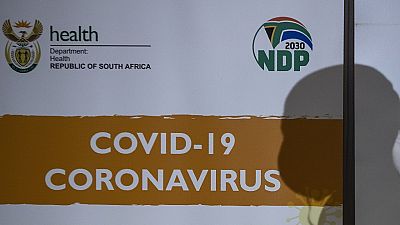

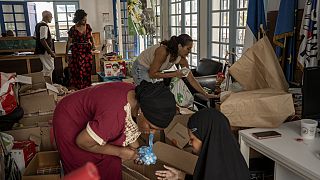
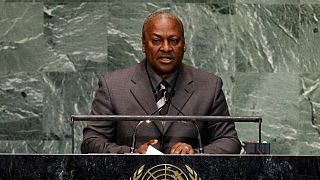
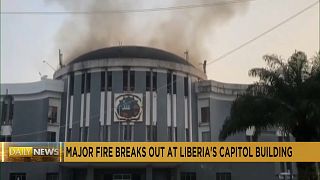
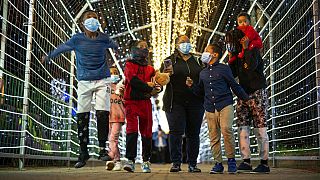
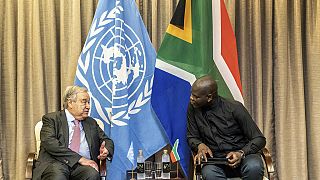
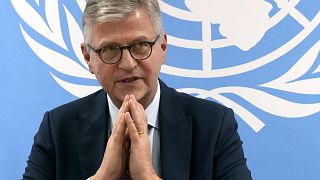
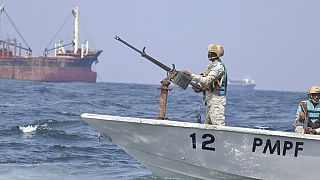
00:57
Kiteboarding sees competitors reach new heights in South Africa
02:00
South African project helps deaf people build farming skills and find jobs
Go to video
USA: McKinsey pays fine for corruption in South Africa
01:09
Six bodies retrieved from illegal goldmine in South Africa
01:40
Ramaphosa says G20 to caution itself from Trump's America First policies
01:02
South Africa poised to take over the leadership of the G20 on Sunday